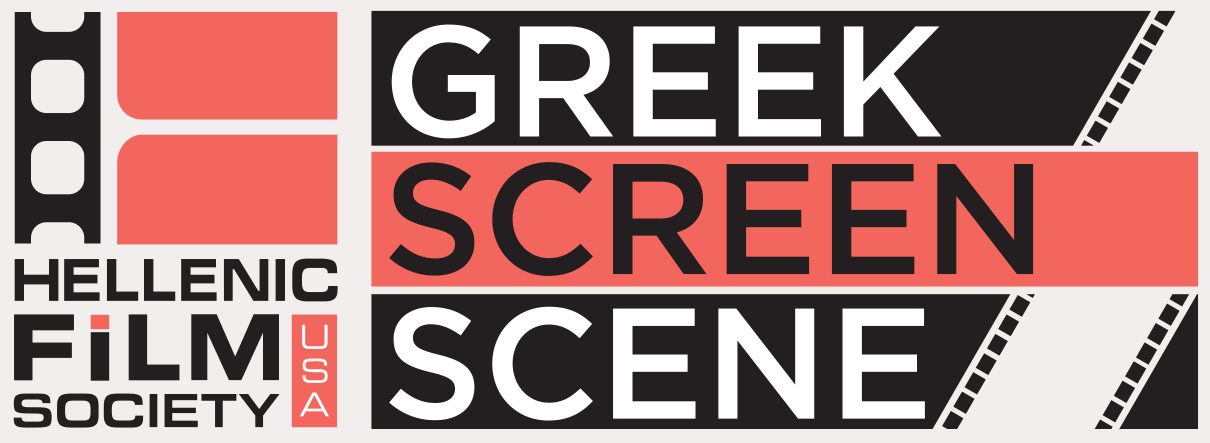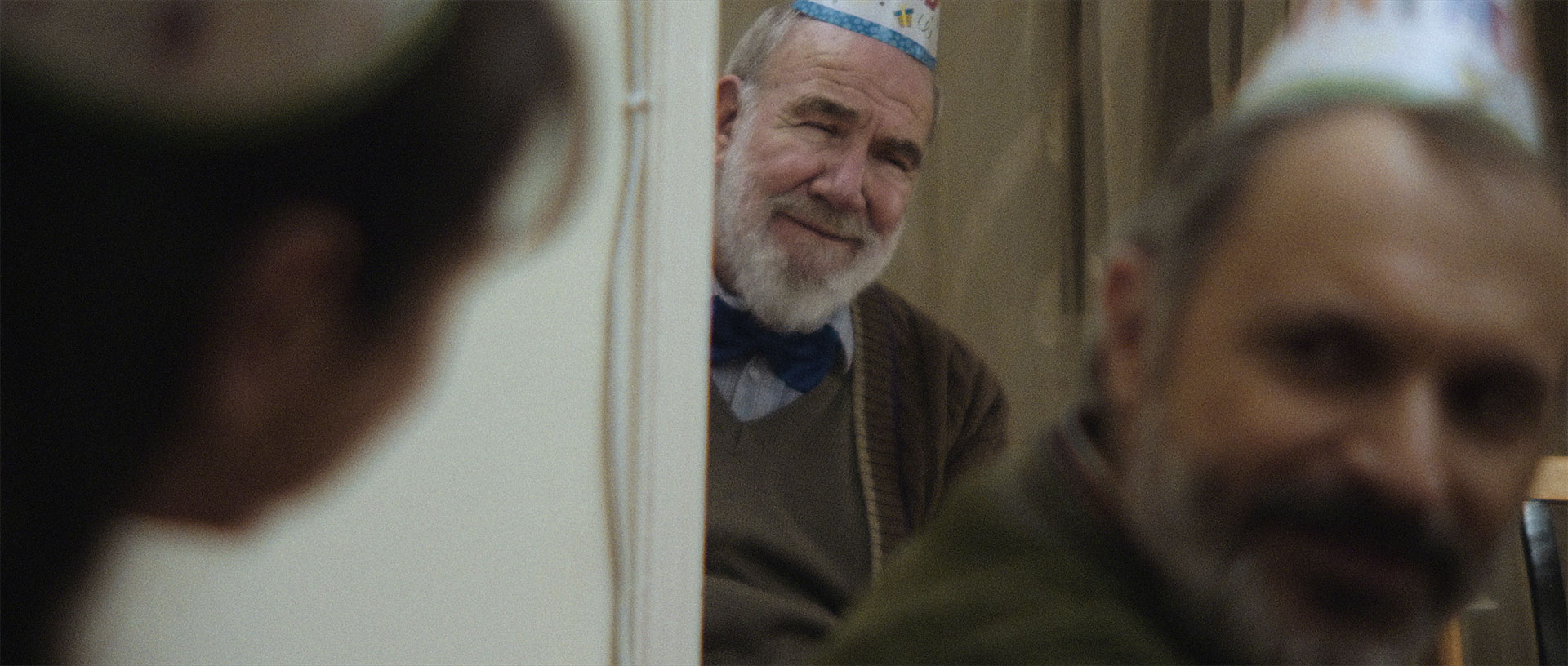JANUARY 2024

The Hellenic Film Society is proud to launch Greek Screen Scene, our new newsletter, which we will post periodically, containing the latest news about Greek film. We welcome your comments and feedback.

SUNDANCE FILM FESTIVAL
HOSTS FILMS BY
TWO GREEK DIRECTORS
HOSTS FILMS BY
TWO GREEK DIRECTORS
The Battle for Laikipia,a full-length documentary directed by Daphne Matziaraki and Peter Murimi, examines how unresolved injustices and climate change raise the tension in the long-standing conflict between indigenous pastoralists and white landowners in northern Kenya.
Matziaraki is remembered as the director of the Oscar-nominated short 4.1 Miles, about Coast Guard Captain Kyriakos Papadopoulos who saved thousands of refugees from the waters off Mytilini.
Self-taught filmmaker Vaggelio Soumeli was represented at Sundance by Phoebe, a short film about a 26-year-old mother who takes her young son to visit his imprisoned father.
DIGNITY,
MOVING FAMILY DRAMA,
DRAWS ATTENTION
DIGNITY,
MOVING FAMILY DRAMA,
DRAWS ATTENTION

This emphatically theatrical domestic drama looks at family members as they gather to celebrate the birthday of their ailing patriarch. When the fraught question of who is to care for the aging father comes up, the party evolves into an intense confrontation. Secrets and mistakes of the past are revealed, changing the lives of all involved.
“My sister was actually the inspiration for the film,” says Katsimiris. “She had an extended hospital stay, and for months I watched her confined to a bed while relatives whispered about her on the other side of the hospital room door and made decisions on her behalf. The aging father in my film listens behind a door as his children make decisions about his care.”
Katsimiris credits his pre-filmmaker career as a social worker for sharpening his understanding of seniors. “I hope my film raises questions and inspires conversation about caring for the elderly. Do we stand by them in difficult times, or do we take the nursing home solution? These are tough questions.”
The film is expertly acted by its strong ensemble cast, with veteran actress Vangelio Andreadaki standing out as the neighbor who appears late in the proceedings and acts as the catalyst for the final confrontation. Her performance won her a Hellenic Film Academy Award nomination as Best Supporting Actress.
Dignity had its New York premiere at the New York Greek Film Expo 2023 where it was enthusiastically received. The film will be shown once more at the Museum of the Moving Image in Astoria on Sunday, February 18 as part of the Hellenic Film Society’s Always on Sunday monthly Greek film series.
For tickets and information, click here.

DIGNITY,
MOVING FAMILY DRAMA,
DRAWS ATTENTION
DIGNITY,
MOVING FAMILY DRAMA,
DRAWS ATTENTION
This emphatically theatrical domestic drama looks at family members as they gather to celebrate the birthday of their ailing patriarch. When the fraught question of who is to care for the aging father comes up, the party evolves into an intense confrontation. Secrets and mistakes of the past are revealed, changing the lives of all involved.
“My sister was actually the inspiration for the film,” says Katsimiris. “She had an extended hospital stay, and for months I watched her confined to a bed while relatives whispered about her on the other side of the hospital room door and made decisions on her behalf. The aging father in my film listens behind a door as his children make decisions about his care.”
Katsimiris credits his pre-filmmaker career as a social worker for sharpening his understanding of seniors. “I hope my film raises questions and inspires conversation about caring for the elderly. Do we stand by them in difficult times, or do we take the nursing home solution? These are tough questions.”
The film is expertly acted by its strong ensemble cast, with veteran actress Vangelio Andreadaki standing out as the neighbor who appears late in the proceedings and acts as the catalyst for the final confrontation. Her performance won her a Hellenic Film Academy Award nomination as Best Supporting Actress.
Dignity had its New York premiere at the New York Greek Film Expo 2023 where it was enthusiastically received. The film will be shown once more at the Museum of the Moving Image in Astoria on Sunday, February 18 as part of the Hellenic Film Society’s Always on Sunday monthly Greek film series.
For tickets and information, click here.

GREEK FILMS
WIN MAJOR AWARDS
AT 64TH THESSALONIKI
INTERNATIONAL FILM FESTIVAL
WIN MAJOR AWARDS
AT 64TH THESSALONIKI
INTERNATIONAL FILM FESTIVAL
Dimitra Vlagopoulou, who stars in the film, shared the Best Actress award. She plays Kalia, the modestly talented head of a group of workers—animateurs—who entertain guests at a second-rate summer resort hotel. Over the course of her ninth summer on the job, she comes to realize that she is aging and that her career as a seasonal entertainer is coming to an end.
Another major win in the international competition was the Best Actor award to Kostas Koroneos, playing the title character in The Last Taxi Driver. Directed by Stergios Paschos, the film focuses on a driver who witnesses the suicide of a customer. The experience upends his dead-end life and makes for a film that is consistently surprising and infinitely watchable.
There were several other Greek films, not part of the international competition, that won major awards, most notably The Murderess (Fonissa). Based on the classic novella by Alexandros Papadiamantis, this was arguably the most eagerly anticipated film in the festival. Directed by Eva Nathena and produced by the notable Dionyssis Samiotis, the film won six awards, including the coveted FIPRESCI International Critics Award for Best Greek Film.
Made with obvious effort to get everything right, the film tells the grim story of Hadoula, a village midwife who considers herself a savior of sorts, by killing young girls to spare them from the inevitable hardships of life in a patriarchal society. In the words of the FIPRESCI jurors, “The film has a very strong social-historical subject but mixed with powerful contemporary reflections about women’s status today.”
The Costopoulos Foundation award went to Polydroso, directed by Alexandros Voulgaris, for its “unique directorial approach that addresses loss with humor, lyricism and disarming honesty.” The film is the story of a daughter who returns to her home village to care for her mother only to find that she must confront the issues that made her leave in the first place.
The graphic, gay-themed The Summer With Carmen, directed by Zacharias Mavroeidis, won three awards, including the Mermaid Award sponsored by Mastercard. The jury found the film “effortlessly charming and authentic, pretty sensual and spicy, refreshingly light and universal in depicting the dynamics of friendship and human relations.” In accepting the award, Mavroeidis said, “The LGBTQ+ community in Greece has come a long way in the last decade, yet the battle for visibility is a daily struggle. I believe this award contributes to visibility, because visibility is not about what one does in bed. It’s about everything else.”
An interview with Mavroeidis can be found on the Hellenic Film Society’s YouTube channel here.

GREEK FILMS
WIN MAJOR AWARDS
AT 64TH THESSALONIKI
INTERNATIONAL FILM FESTIVAL
WIN MAJOR AWARDS
AT 64TH THESSALONIKI
INTERNATIONAL FILM FESTIVAL
Dimitra Vlagopoulou, who stars in the film, shared the Best Actress award. She plays Kalia, the modestly talented head of a group of workers—animateurs—who entertain guests at a second-rate summer resort hotel. Over the course of her ninth summer on the job, she comes to realize that she is aging and that her career as a seasonal entertainer is coming to an end.
Another major win in the international competition was the Best Actor award to Kostas Koroneos, playing the title character in The Last Taxi Driver. Directed by Stergios Paschos, the film focuses on a driver who witnesses the suicide of a customer. The experience upends his dead-end life and makes for a film that is consistently surprising and infinitely watchable.
There were several other Greek films, not part of the international competition, that won major awards, most notably The Murderess (Fonissa). Based on the classic novella by Alexandros Papadiamantis, this was arguably the most eagerly anticipated film in the festival. Directed by Eva Nathena and produced by the notable Dionyssis Samiotis, the film won six awards, including the coveted FIPRESCI International Critics Award for Best Greek Film.
Made with obvious effort to get everything right, the film tells the grim story of Hadoula, a village midwife who considers herself a savior of sorts, by killing young girls to spare them from the inevitable hardships of life in a patriarchal society. In the words of the FIPRESCI jurors, “The film has a very strong social-historical subject but mixed with powerful contemporary reflections about women’s status today.”
The Costopoulos Foundation award went to Polydroso, directed by Alexandros Voulgaris, for its “unique directorial approach that addresses loss with humor, lyricism and disarming honesty.” The film is the story of a daughter who returns to her home village to care for her mother only to find that she must confront the issues that made her leave in the first place.
The graphic, gay-themed The Summer With Carmen, directed by Zacharias Mavroeidis, won three awards, including the Mermaid Award sponsored by Mastercard. The jury found the film “effortlessly charming and authentic, pretty sensual and spicy, refreshingly light and universal in depicting the dynamics of friendship and human relations.” In accepting the award, Mavroeidis said, “The LGBTQ+ community in Greece has come a long way in the last decade, yet the battle for visibility is a daily struggle. I believe this award contributes to visibility, because visibility is not about what one does in bed. It’s about everything else.”
An interview with Mavroeidis can be found on the Hellenic Film Society’s YouTube channel here.
THREE GREEK
DIRECTORS DRAW
WORLDWIDE
ATTENTION
THREE GREEK
DIRECTORS DRAW
WORLDWIDE
ATTENTION

Nikou, whose first film, Apples, was released in more countries than any other Greek-language film, makes his English language debut with Fingernails, a dystopian science fiction story that pits science vs. emotion. A computer test is devised to remove all uncertainty from romance as it determines if what couples feel for one another is real love. Ultimately, one couple discovers that while a computer can profess to quantify love, romance is, in reality, impervious to scientific measurement. The film is available for streaming on Apple TV and you can see our interview with the director on our YouTube channel here.
Six years after the critical and commercial misfire of Downsizing, Payne returns to the big screen at the top of his form with The Holdovers. The story involves a curmudgeonly teacher at a New England prep school who, when forced to stay on campus during Christmas break to supervise a few students who have nowhere to go, forms unlikely bonds with a troubled student and the school’s head cook. Payne reunites with Paul Giamatti, who turns in a stellar performance as the teacher. The film has earned five Academy Award nominations, including Best Picture and Best Actor (Giamatti).
Lanthimos received an unprecedented 10-minute standing ovation when Poor Things premiered at the 2023 Venice Film Festival, and the film went on to win the coveted Golden Lion. An unhappily married woman in Victorian England throws herself from London’s Tower Bridge. A mad doctor retrieves the body and reanimates it, implanting the brain of her unborn baby in the adult body of the deceased.
As he showed in the widely acclaimed The Favourite, Lanthimos uses genre to his own ends rather than stick to its conventions. Just as he reinvented the costume-drama genre in that film, the Frankenstein story will never quite be the same ever again.
Poor Things has been nominated for 11 Academy Awards, including Best Picture and Best Director (Lanthimos).
THREE GREEK
DIRECTORS DRAW
WORLDWIDE
ATTENTION
THREE GREEK
DIRECTORS DRAW
WORLDWIDE
ATTENTION

Nikou, whose first film, Apples, was released in more countries than any other Greek-language film, makes his English language debut with Fingernails, a dystopian science fiction story that pits science vs. emotion. A computer test is devised to remove all uncertainty from romance as it determines if what couples feel for one another is real love. Ultimately, one couple discovers that while a computer can profess to quantify love, romance is, in reality, impervious to scientific measurement. The film is available for streaming on Apple TV and you can see our interview with the director on our YouTube channel here.
Six years after the critical and commercial misfire of Downsizing, Payne returns to the big screen at the top of his form with The Holdovers. The story involves a curmudgeonly teacher at a New England prep school who, when forced to stay on campus during Christmas break to supervise a few students who have nowhere to go, forms unlikely bonds with a troubled student and the school’s head cook. Payne reunites with Paul Giamatti, who turns in a stellar performance as the teacher. The film has earned five Academy Award nominations, including Best Picture and Best Actor (Giamatti).
Lanthimos received an unprecedented 10-minute standing ovation when Poor Things premiered at the 2023 Venice Film Festival, and the film went on to win the coveted Golden Lion. An unhappily married woman in Victorian England throws herself from London’s Tower Bridge. A mad doctor retrieves the body and reanimates it, implanting the brain of her unborn baby in the adult body of the deceased.
As he showed in the widely acclaimed The Favourite, Lanthimos uses genre to his own ends rather than stick to its conventions. Just as he reinvented the costume-drama genre in that film, the Frankenstein story will never quite be the same ever again.
Poor Things has been nominated for 11 Academy Awards, including Best Picture and Best Director (Lanthimos).

PERIKLIS CHOURSOGLOU
RETURNS TO THE BIG SCREEN
PERIKLIS CHOURSOGLOU
RETURNS TO THE BIG SCREEN
It has been nearly 15 years since his last feature film was released, time spent teaching filmmaking at the Aristotle University of Thessaloniki. Recently retired from teaching, Choursoglou has returned to the big screen with an introspective film that delves into personal, and often difficult, moments of his life and molds them into a searingly powerful and moving drama.
Like Chorsoglou himself, Nikos, his protagonist, teaches filmmaking in Thessaloniki. He is married to an actress and is the father of two sons. On the occasion of his promotion to higher rank, Nikos invites his father to accompany him to the university for the promotion ceremony. The trip provides an opportunity for father and son to relive experiences and memories of the past and to sharpen their connection. An unexpected plot twist toward the end of the film deepens the drama and leads Nikos to self-discovery and cathartic healing.
The Promotion is made with the wisdom that only a talented seasoned filmmaker can provide. It is filled with moments that resonate, including a classroom scene that captures the essence of great teaching. The film marks the welcome return of a master filmmaker who evidently has much more to give to his audience.

PERIKLIS CHOURSOGLOU
RETURNS TO THE BIG SCREEN
PERIKLIS CHOURSOGLOU
RETURNS TO THE BIG SCREEN
It has been nearly 15 years since his last feature film was released, time spent teaching filmmaking at the Aristotle University of Thessaloniki. Recently retired from teaching, Choursoglou has returned to the big screen with an introspective film that delves into personal, and often difficult, moments of his life and molds them into a searingly powerful and moving drama.
Like Chorsoglou himself, Nikos, his protagonist, teaches filmmaking in Thessaloniki. He is married to an actress and is the father of two sons. On the occasion of his promotion to higher rank, Nikos invites his father to accompany him to the university for the promotion ceremony. The trip provides an opportunity for father and son to relive experiences and memories of the past and to sharpen their connection. An unexpected plot twist toward the end of the film deepens the drama and leads Nikos to self-discovery and cathartic healing.
The Promotion is made with the wisdom that only a talented seasoned filmmaker can provide. It is filled with moments that resonate, including a classroom scene that captures the essence of great teaching. The film marks the welcome return of a master filmmaker who evidently has much more to give to his audience.
THANOS TOKAKIS SCORES WITH TWO NEW FILMS
THANOS TOKAKIS SCORES WITH TWO NEW FILMS
 The palpable buzz among viewers of the Greek films at the 64th Thessaloniki International Film Festival centered on actor Thanos Tokakis and his notable performances in two new films: Little Things That Went Wrong and The Rhapsodist.
The palpable buzz among viewers of the Greek films at the 64th Thessaloniki International Film Festival centered on actor Thanos Tokakis and his notable performances in two new films: Little Things That Went Wrong and The Rhapsodist.Widely known in Greece for his theater, TV and film work, Tokakis won the Hellenic Film Academy Award for Best Supporting Actor in 2020 for his performance in My Name Is Eftyhia. His two new films are bound to bring him more accolades.
Tokakis gives a riveting performance of unsettling depth in Little Things, directed by Haris Vafeiadis. He plays the increasingly unhinged Fanis, a former TV celebrity who hits rock bottom and is desperate to win the affection of his mostly disinterested estranged young daughter.
“Fanis is perhaps the most charming loser I have ever portrayed,” says Tokakis. “Losers intrigue me, and I enjoy interpreting them. I try to find the reason for their existence, the justification for their actions, and the reason they continue to struggle even if it leads them to destruction.”
Nikolai Hamel, the American director of The Rhapsodist, said he wanted to make a film that is as zany as it is entertaining. In classical Greece, Tokakis explained, a rhapsodist was a professional performer of epic poetry. In the film he is a storyteller in a bar, captivating patrons with increasingly bizarre tales of magic and petty crime.
“I saw this as a fantastic challenge, especially since I would share the madness with my beloved friend Prometheas Aleiferopoulos,” Tokakis said.
Aleiferopoulos’ involvement in the film went beyond the role of costar. A noted actor himself, he co-wrote the highly original script with the director, who doesn’t speak Greek.
Tokakis is pretty much given a free hand to interpret the title character as he sees fit. Taking full advantage of what seems like an artistic free for all, he delivers a memorable comic performance that is sure to please audiences. “The aesthetic framework fully suited my taste,” Tokakis says.
You can watch an interview with Thanos Tokakis on the Hellenic Film Society’s YouTube channel.
THANOS TOKAKIS SCORES WITH TWO NEW FILMS
THANOS TOKAKIS SCORES WITH TWO NEW FILMS
 The palpable buzz among viewers of the Greek films at the 64th Thessaloniki International Film Festival centered on actor Thanos Tokakis and his notable performances in two new films: Little Things That Went Wrong and The Rhapsodist.
The palpable buzz among viewers of the Greek films at the 64th Thessaloniki International Film Festival centered on actor Thanos Tokakis and his notable performances in two new films: Little Things That Went Wrong and The Rhapsodist.Widely known in Greece for his theater, TV and film work, Tokakis won the Hellenic Film Academy Award for Best Supporting Actor in 2020 for his performance in My Name Is Eftyhia. His two new films are bound to bring him more accolades.
Tokakis gives a riveting performance of unsettling depth in Little Things, directed by Haris Vafeiadis. He plays the increasingly unhinged Fanis, a former TV celebrity who hits rock bottom and is desperate to win the affection of his mostly disinterested estranged young daughter.
“Fanis is perhaps the most charming loser I have ever portrayed,” says Tokakis. “Losers intrigue me, and I enjoy interpreting them. I try to find the reason for their existence, the justification for their actions, and the reason they continue to struggle even if it leads them to destruction.”
Nikolai Hamel, the American director of The Rhapsodist, said he wanted to make a film that is as zany as it is entertaining. In classical Greece, Tokakis explained, a rhapsodist was a professional performer of epic poetry. In the film he is a storyteller in a bar, captivating patrons with increasingly bizarre tales of magic and petty crime.
“I saw this as a fantastic challenge, especially since I would share the madness with my beloved friend Prometheas Aleiferopoulos,” Tokakis said.
Aleiferopoulos’ involvement in the film went beyond the role of costar. A noted actor himself, he co-wrote the highly original script with the director, who doesn’t speak Greek.
Tokakis is pretty much given a free hand to interpret the title character as he sees fit. Taking full advantage of what seems like an artistic free for all, he delivers a memorable comic performance that is sure to please audiences. “The aesthetic framework fully suited my taste,” Tokakis says.
You can watch an interview with Thanos Tokakis on the Hellenic Film Society’s YouTube channel.
THANOS TOKAKIS SCORES WITH TWO NEW FILMS
THANOS TOKAKIS SCORES WITH TWO NEW FILMS
 The palpable buzz among viewers of the Greek films at the 64th Thessaloniki International Film Festival centered on actor Thanos Tokakis and his notable performances in two new films: Little Things That Went Wrong and The Rhapsodist.
The palpable buzz among viewers of the Greek films at the 64th Thessaloniki International Film Festival centered on actor Thanos Tokakis and his notable performances in two new films: Little Things That Went Wrong and The Rhapsodist.Widely known in Greece for his theater, TV and film work, Tokakis won the Hellenic Film Academy Award for Best Supporting Actor in 2020 for his performance in My Name Is Eftyhia. His two new films are bound to bring him more accolades.
Tokakis gives a riveting performance of unsettling depth in Little Things, directed by Haris Vafeiadis. He plays the increasingly unhinged Fanis, a former TV celebrity who hits rock bottom and is desperate to win the affection of his mostly disinterested estranged young daughter.
“Fanis is perhaps the most charming loser I have ever portrayed,” says Tokakis. “Losers intrigue me, and I enjoy interpreting them. I try to find the reason for their existence, the justification for their actions, and the reason they continue to struggle even if it leads them to destruction.”
Nikolai Hamel, the American director of The Rhapsodist, said he wanted to make a film that is as zany as it is entertaining. In classical Greece, Tokakis explained, a rhapsodist was a professional performer of epic poetry. In the film he is a storyteller in a bar, captivating patrons with increasingly bizarre tales of magic and petty crime.
“I saw this as a fantastic challenge, especially since I would share the madness with my beloved friend Prometheas Aleiferopoulos,” Tokakis said.
Aleiferopoulos’ involvement in the film went beyond the role of costar. A noted actor himself, he co-wrote the highly original script with the director, who doesn’t speak Greek.
Tokakis is pretty much given a free hand to interpret the title character as he sees fit. Taking full advantage of what seems like an artistic free for all, he delivers a memorable comic performance that is sure to please audiences. “The aesthetic framework fully suited my taste,” Tokakis says.
You can watch an interview with Thanos Tokakis on the Hellenic Film Society’s YouTube channel.

INCENTIVES SPARK FILM PRODUCTION IN GREECE
INCENTIVES SPARK FILM PRODUCTION IN GREECE
“There is huge competition among countries trying to attract international film productions, and Greece is now notably competitive,” Kouanis told a Capital Link Forum audience at New York’s Metropolitan Club in December.
EKOME supports foreign and domestic audiovisual production in Greece. Film projects that meet certain requirements can receive a rebate of up to 40 percent of their production costs in addition to a 30-percent cut in taxes.
From April 2018 to January 2023, 322 applications have been included in the cash rebate program: 143 international and 179 domestic. Total investment capital for the period amounts to €619 million.
“Many productions are coming to Greece—from Paramount, Netflix, and Disney among them,” said Kouanis. “The effect on the economy, on tourism, and on the local communities is huge.” Thousands of jobs have been created, and the country’s economy has been impressively enriched.
In addition to the incentives, Greece is helped by the fact that it is less expensive than northern European countries, and the climate is ideal. Lack of infrastructure, particularly studios, is a problem, Kouanis explained, but that will be taken care of in the near future.
Kouanis left EKOME recently to form GravityBreath Pictures, an audiovisual production company originating in Greece, offering a comprehensive suite of services to facilitate film production and other projects for audiences across the globe.
Production still for Swing Away (2017), Lindos, Rhodes, Greece. Photo © Petros Chytiris

INCENTIVES SPARK FILM PRODUCTION IN GREECE
INCENTIVES SPARK FILM PRODUCTION IN GREECE
“There is huge competition among countries trying to attract international film productions, and Greece is now notably competitive,” Kouanis told a Capital Link Forum audience at New York’s Metropolitan Club in December.
EKOME supports foreign and domestic audiovisual production in Greece. Film projects that meet certain requirements can receive a rebate of up to 40 percent of their production costs in addition to a 30-percent cut in taxes.
From April 2018 to January 2023, 322 applications have been included in the cash rebate program: 143 international and 179 domestic. Total investment capital for the period amounts to €619 million.
“Many productions are coming to Greece—from Paramount, Netflix, and Disney among them,” said Kouanis. “The effect on the economy, on tourism, and on the local communities is huge.” Thousands of jobs have been created, and the country’s economy has been impressively enriched.
In addition to the incentives, Greece is helped by the fact that it is less expensive than northern European countries, and the climate is ideal. Lack of infrastructure, particularly studios, is a problem, Kouanis explained, but that will be taken care of in the near future.
Kouanis left EKOME recently to form GravityBreath Pictures, an audiovisual production company originating in Greece, offering a comprehensive suite of services to facilitate film production and other projects for audiences across the globe.
Production still for Swing Away (2017), Lindos, Rhodes, Greece. Photo © Petros Chytiris
CLASSIC ATHENS
CINEMA CLOSES
CINEMA CLOSES
Opened in 1921 on Panepistimiou Street, not far from the Rex, the Ideal offered audiences the opportunity to enjoy films screened in a beautifully appointed theater with state-of-the-art projection. It was the first theater to bring Dolby sound to Greece and for a while had the largest movie screen in Europe.
The Schliemann-Mela Mansion, which housed the Ideal, will undergo a €36-million conversion into a luxury hotel.
Famed directors Yorgos Lanthimos and Costa-Gavras were among the many film professionals who joined the general public in a futile effort to stop the closing.
Another beloved theater in central Athens, the Astor, is scheduled to close soon to make way for an office complex. Like the Ideal, the Astor is housed in a building owned by the National Social Security Fund.

NEW YORK GREEK FILM EXPO DEMONSTRATES
THE STRENGTH OF GREEK CINEMA:
REAL STORIES ABOUT REAL PEOPLE
THE STRENGTH OF GREEK CINEMA:
REAL STORIES ABOUT REAL PEOPLE
That same weekend, the New York Greek Film Expo screened films about a desperate mother searching for her missing adult son; a deaf teenage girl confronting the prejudices of her peers and neighbors; a family tackling the fraught question of who is to care for their ailing patriarch; and a young lawyer facing his obligations as a professional, a friend, and a son.
The contrast was stunning and illuminated the strengths of current Greek films. The Expo films focused on real people facing real-life issues. “This is the real strength of current Greek cinema,” noted an audience member. “There are no sequels or comic book heroes. No car chases or sociopaths lurking in dark corners. Greeks are making interesting films that sophisticated audiences everywhere can relate to. How many times this year was there an American film that you felt you had to see?”
CLASSIC ATHENS
CINEMA CLOSES
CINEMA CLOSES
Opened in 1921 on Panepistimiou Street, not far from the Rex, the Ideal offered audiences the opportunity to enjoy films screened in a beautifully appointed theater with state-of-the-art projection. It was the first theater to bring Dolby sound to Greece and for a while had the largest movie screen in Europe.
The Schliemann-Mela Mansion, which housed the Ideal, will undergo a €36-million conversion into a luxury hotel.
Famed directors Yorgos Lanthimos and Costa-Gavras were among the many film professionals who joined the general public in a futile effort to stop the closing.
Another beloved theater in central Athens, the Astor, is scheduled to close soon to make way for an office complex. Like the Ideal, the Astor is housed in a building owned by the National Social Security Fund.

NEW YORK GREEK FILM EXPO DEMONSTRATES
THE STRENGTH OF GREEK CINEMA:
REAL STORIES ABOUT REAL PEOPLE
THE STRENGTH OF GREEK CINEMA:
REAL STORIES ABOUT REAL PEOPLE
That same weekend, the New York Greek Film Expo screened films about a desperate mother searching for her missing adult son; a deaf teenage girl confronting the prejudices of her peers and neighbors; a family tackling the fraught question of who is to care for their ailing patriarch; and a young lawyer facing his obligations as a professional, a friend, and a son.
The contrast was stunning and illuminated the strengths of current Greek films. The Expo films focused on real people facing real-life issues. “This is the real strength of current Greek cinema,” noted an audience member. “There are no sequels or comic book heroes. No car chases or sociopaths lurking in dark corners. Greeks are making interesting films that sophisticated audiences everywhere can relate to. How many times this year was there an American film that you felt you had to see?”
GREEK FILM TRIVIA
Alexandros Papadiamantis (1851-1911), author of the classic novella I Fonissa (The Murderess), was born, the son of a priest, on the island of Skiathos. While the island plays a major role in his writings, the current film version of his novella was shot in Mani.
Papadiamantis wrote in the katharevousa style of Greek, established in the late 18th century as a literary language, blending ancient Greek with the contemporary vernacular.
This is the second time that Papadiamantis’s novella has been filmed. The first was in 1974, directed by Costa Ferris.
Animal became the first Greek film in 30 years to win the Golden Alexander Award at the Thessaloniki Film Festival. The first Greek film to do that back in 1993 was From the Snow, directed by Sotiris Goritsas.
Alexander Voulgaris, director of Polydroso, was born in Athens in 1981. A screenwriter, director, composer and actor, he frequently works under the name of The Boy. He is the son of master filmmaker Pandelis Voulgaris and noted author Ioanna Karystiani.
Please consider a giſt to the Hellenic Film Society so we can continue to present Greek films that entertain, inform, and inspire.
Or checks may be made payable to: Hellenic Film Society USA, Inc.,
can be sent to: Hellenic Film Society USA, 35-07 Broadway, Astoria, NY 11106
All donations are tax deductible. Thank you for your consideration
Our free YouTube channel has 1.7+ Million views!
to see Greek films and interviews with filmmakers
AND PLEASE FORWARD THIS EMAIL
TELL ALL YOUR FRIENDS!
Do you enjoy our updates? Please forward to someone else interested in Greek film.
If this email was forwarded to you, click here to subscribe.
 |
 |  |
 |  |  |  |  |

The Hellenic Film Society USA is a 501(c)(3) non-profit organization rooted in the belief that Greek cinema deserves to be part of
the American cultural landscape. We promote feature films, documentaries, and film shorts made by Greek filmmakers and those
of Greek descent, as well as films that promote the cultures of Greece and Cyprus.
For further information or to learn how to partner with us, please visit hellenicfilmusa.org or call 347-934-9497. We invite you to
sign up for our mailing list and follow us on Facebook and Instagram.
Copyright © 2024 Hellenic Film Society USA. All rights reserved.




 Before Getting Started
Before Getting Started FREQUENTLY ASKED QUESTIONS
FREQUENTLY ASKED QUESTIONS